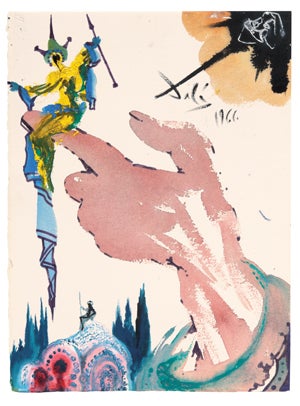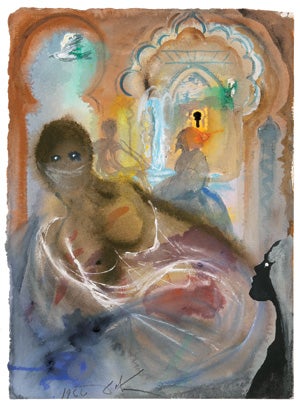
Fantastical monsters, daredevil youths and evil witches bound across every page of this beautiful new Folio edition of Calvino’s comprehensive collection.
Illustrated by Salvador Dalí
Introduced by Robert Irwin
Translated by Malcolm C. Lyons
Limited to 750 hand-numbered copies
Salvador Dalí’s striking series of 50 watercolours inspired by the 1001 Nights with the tales, introduced by Robert Irwin, printed in a separate volume.
With their jinn and sorcerers, evocative locations and pervasive erotic charge, The One Thousand and One Nights have enthralled audiences for centuries. Although best known as a painter, Salvador Dalí illustrated more than one hundred titles and his imaginative power, and ability to transport the reader to an exotic other world, make him one of the great interpreters of this collection of stories. Dalí’s 50 illustrations are a blaze of vivid colours abounding with figures of humans, animals and curious monsters, shifting between the familiar and the disorientating. The stories have been printed in a separate volume in a smaller format more convenient for reading.
Plates Volume
112 pages with 50 full-page colour plates
Printed on Modigliani paper
Plates protected with translucent overlays
Typeset in Abril
Quarter-bound in calfskin with sides covered in Tsarina Crush
Blocked in gold
Gilded top edge
18˝ x 13½˝
Text Volume
512 pages typeset in Fournier on Abbey Wove paper
Bound in cloth inset with title label
Ribbon marker
9¼˝ x 6˝
Solander Presentation Box
Bound in cloth and blocked with a design by Ged Palmer in gold and cream foil
The rich visual potential of the Nights has inspired a broader range of illustrators than almost any other text. Edmund Dulac, William Heath Robinson and Arthur Rackham all produced fine work for children’s editions of the Nights, while more sophisticated and painterly approaches were offered by artists as diverse as Kay Nielsen, Marc Chagall and Kees van Dongen. Yet the richest and most nuanced response of all came from one of art’s most distinctive and controversial visionaries, Salvador Dalí.

Dalí appears to have engineered The One Thousand and One Nights commission himself. Giuseppe and Mara Albaretto, a wealthy Italian couple who became enthusiasts and collectors of Dalí’s work, arranged for him to illustrate a series of books for Turin-based publisher Rizzoli. The first of these was the Bible in 1963, but Dalí, who did not share Giuseppe’s deeply committed Catholicism, insisted that the book he wanted to illustrate was The One Thousand and One Nights.
Everything about Dalí seemed peculiarly suited to the Nights – his fascination with the Arab world (improbably, he claimed Moorish descent), his indomitable and tortured obsession with the erotic, even his improvised approach to composition, which mirrored that of the tales’ narrator, Shahrazad. Yet above all it is his imaginative power, his ability not merely to transport his readers to an exotic other world, but to take them on an exhilarating sensory and psychological journey, that makes him one of the great interpreters of this collection of stories. Executed in a blaze of vivid colours, his illustrations abound with figures – humans, animals, curious monsters – which shift between the familiar and the disorientating, and include deliberate anachronism and motifs recognisable from Dalí’s other works. At once rooted in the tales and departing from them, Dalí’s watercolours have an almost hallucinatory effect.
For reasons which remain unclear, the project was abandoned, with Dalí having completed only 100 of the 500 illustrations he had been contracted to produce, all of them dated 1966. Of these, half were retained by Rizzoli and either lost or irreparably damaged. The other half went to the Albarettos and were inherited by their daughter Christiana.
‘The One Thousand and One Nights is a compendium of great images which are at once a companion to the stories and independent from them’
- Ricard Mas Peinado
‘Even without Dalí’s charisma and sans his art, his work as an illustrator alone would have brought him a well-deserved immortality’
- Reynolds Morse
Best known as the painter of such Surrealist masterpieces as The Persistence of Memory (1931), Metamorphosis of Narcissus(1937) and The Temptation of St Anthony (1946), the Spanish artist Salvador Dalí mastered a staggering range of media, including printmaking, sculpture, fashion and writing in both Catalan and French. His work in film includes collaborations with Luis Buñuel and Alfred Hitchcock.
Outspoken and controversial – he was expelled from the Surrealist circle for his reactionary views – studiedly flamboyant and unapologetically self-promoting, Dalí’s personality matched his talent both in scale and in its propensity to divide opinion. One unusually underappreciated element of his output, however, is his work in book illustration. Among the more than 100 titles Dalí illustrated during his career are editions of Don Quixote, Shakespeare’s Macbeth, a commission from the Italian government to illustrate the Divine Comedy on the 700th anniversary of Dante’s birth, and, in 1965, at Dalí’s own request, The One Thousand and One Nights. Many of these illustration sequences provide a disarming contrast to the academically precise execution of his most famous paintings, and confirm him as a profound and sensitive interpreter of literary works.

The One Thousand and One Nights – the collection of Middle Eastern and South Asian folk tales compiled in Arabic during the Islamic Golden Age of the 8th to the 13th century – has enthralled European audiences ever since the first translations appeared in the early 18th century. With their jinn and sorcerers, ghouls and monsters, their evocative, semi-legendary locations and pervasive erotic charge, the Nights have fired the imagination of artists in all media – from the writings of Poe, Flaubert and others to the operas by Weber and Rimsky-Korsakov and, later, countless adaptations in film and television.
‘The most ambitious and thorough translation into English of the Arabian Nights since the age of Queen Victoria and the British empire’
- The Guardian
In his introduction to the accompanying text volume for this edition the novelist, critic and Middle East editor of The Times Literary Supplement Robert Irwin explores the peculiar fascination this commission held for Dalí, as well as giving an insightful analysis of his artistic influences and comparing his interpretation of the Nights with those of other illustrators. An authority on Surrealism, Orientalism and The One Thousand and One Nights in particular, Irwin worked closely with the former Cambridge professor of Arabic Malcolm C. Lyons, whose elegant and idiomatic translation – produced in collaboration with his wife Ursula – provides the perfect companion to Dalí’s beguiling illustrations.
‘Dalí’s images pulse with life in a manner very rarely matched by other artists’
- Robert Irwin
For this Folio Society limited edition, for both ease of reference and protection of the images, the illustrations are collected in an elegant, large-format volume, which does full justice to Dalí’s sumptuous watercolours. Each illustration has a translucent overlay marked with the number of the Night to which it refers in the text volume. The stories have been printed separately in a smaller format more convenient for reading. The two volumes are presented together in a handsome solander box designed by calligrapher Ged Palmer.
